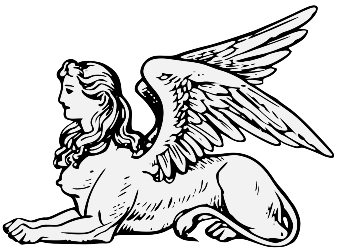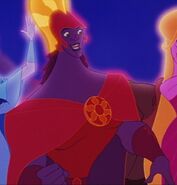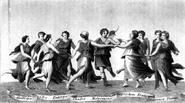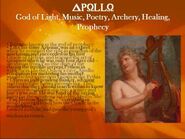Apollo is the only Greek god to have the same name as his Roman counterpart. He is the god of music (he directed the choir of the Muses), of prophecy, colonisation, medicine, the sun, light, purity, archery (but not for war or hunting), poetry, dance, intellectual inquiry, knowledge, and also the protector of herds and flocks. He is the son of Zeus and Leto and the younger twin brother of Artemis. He was born on the island of Delos, which is sacred to him. His paternal grandparents were Cronus and Rhea. His maternal grandparents are Coeus and Phoebe (from whom he takes the ephithet "Phoebus" meaning "radiant" or "beaming"). He was sometimes identified with the sun god Helios.
Family
Immortal Offspring
- Aristaios
With Coronis
With Arsinoe
- Epione (m. Asclepius)
- Hygeia
- Panacea
- Iaso
- Aigle
- Machaon
- Podaleiros
With Calliope (the Muse)
- Orpheus (mortal)
- Linos (mortal)
- The Apollonic Muses, namely
- Cephiso
- Apollonis
- Borysthenis
- Nete
- Mese
- Hypate
Notable Mortal Offspring
With Manto
- Mopsus
With Calliope
- Orpheus
- Linos
Art
Apollo is at most times depicted as a handsome young man, clean shaven and carrying either a lyre, or his bow and arrows. There are many sculptures of Apollo and one of the most famous is the central figure from the west pediment of the Temple of Zeus, at Olympia, showing Apollo declaring victory in favor of the Lapiths in their struggle against the Centaurs.
Epithets
Like most of the major gods, Apollo was given epithets to reflect patronage in a certain area or field.
- Apollo Thearios - Apollo of the Oracle
- Apollo Proopsios - Apollo the Foreseeing
- Apollo Hekebolos - Apollo, Shooter from Afar
- Apollo Mousegetes - Apollo, Leader of the Muses
- Apollo Paieon - Apollo the Healing
- Apollo Alexikakos - Apollo, Averter of Evil
- Apollo Smintheios - Apollo of the Mice
- Apollo Lykios - Apollo of the Wolves
- Apollo Parnopios - Apollo of the Locusts
- Apollo Erythibios - Apollo of the Mildew
- Apollo Pythios - Apollo of the Python
- Apollo Latoios - Apollo, son of Leto
- Apollo Phoebus - Apollo the Bright
- Apollo Mantikos - Apollo the Prophetic
- Apollo Iatromantis - Apollo the Physician
- Apollo Argyrotoxos - Apollo with the Silver Bow
- Apollo Nomios - Apollo the Pastoral
In Mythology
Apollo was born on the floating island of Delos.[1] Apollo's oracle at Delphi plays an important role in Greek myth.[2] To win the oracle, he had to kill Python, a serpentine son of Gaia. It was a hard task, but Apollo managed to do it. Apollo's alternate names include:
- Phoebus ("light")
- Smintheus ("plague bearer" or "rat apollo")
- Delian (from the place of his birth, Delos)
- Loxias ("tricky")
- Pythian (from killing Python)
Lovers
- Cassandra - Cassandra was the daughter of Priam of Troy and his wife, Hecuba. The myths say that she was the most beautiful of all the king's children. To win her heart, Apollo started to teach her the art of prophecy. But instead of becoming his lover, Cassandra refused him. Apollo cursed her by saying that when she made a prophecy, nobody would believe her.
- Daphne - Daphne was the daughter of a river god. Before Apollo could get to her, he had to get rid of Leucippus (the son of king Oenomaus). Apollo had a fierce battle with him, and won. Now he could go to Daphne. But she refused. She tried running away, but Apollo was to swift. So Daphne, prayed to her father to turn her into a laurel tree. Her father swiftly did so. Apollo was heartbroken. So he made the laurel his sacred plant.
- Marpessa - Marpessa, the daughter of the river god Evenus and the granddaughter of Ares, caught Apollo's eye. Although Apollo was deeply in love, Marpessa was already engaged to Idas (a son of Poseidon). This didn't stop Apollo. He simply carried Marpessa off away from Idas. Devoted to his love, Idas pursued the god and challenged him to a fight. The two came to blows and Zeus had to intervene. Separating Apollo and Idas, he called Marpessa to the scene of battle. Then, Zeus asked Marpessa who she wanted to marry. Marpessa chose Idas, because "he too was mortal" and she was afraid that Apollo would desert her.
In Popular Culture
Films
- Apollo appears playing a minor role in Clash of the Titans.
- Percy Jackson and the Olympians : The Lightning Thief. He is seen sitting on his throne when Percy returns the lightning bolt.
- Immortals. He is killed by Zeus when he disobeys his orders and helps the protagonist Theseus.
- Hercules ( Animation ). He is seen on Olympus, and when the gods go to fight the Titans.
Portrayal
Gallery
Videos
See Also
Citations
- ^ For the iconography of the Alexander–Helios type, see H. Hoffmann, 1963. "Helios", in Journal of the American Research Center in Egypt 2, pp. 117–23; cf. Yalouris 1980, no. 42.
- ^ Joseph Fontenrose, "Apollo and Sol in the Latin poets of the first century BC", Transactions of the American Philological Association 30 (1939), pp 439–55; "Apollo and the Sun-God in Ovid",American Journal of Philology 61 (1940) pp 429–44; and "Apollo and Sol in the Oaths of Aeneas and Latinus" Classical Philology 38.2 (April 1943), pp. 137–138.
- ^ Behind the Name: Meaning, Origin and History of the Name Apollo
- ^ The ἁπλοῦνsuggestion is repeated by Plutarch in Moralia in the sense of "unity".
- ^ Martin Nilsson, Die Geschichte der Griechische Religion, vol. I (C.H. Beck) 1955:555-564.
- ^ Latacz, Joachim, Troia und Homer: Der Weg zur Lösung eines alten Rätsels. (Munich) 2001:138.
- ^ de Grummond, Nancy Thomson (2006) Etruscan Myth, Sacred History, and Legend. (Philadelphia, Pennsylvania: University of Pennsylvania Museum of Archaeology and Anthropology); Mackenzie, Donald A. (2005) Myths of Babylonia and Assyria (Gutenberg)
- ^ Burkert, Walter. Greek Religion, 1985:144.
- ^ Graf, Apollo p. 104-113; Burkert also notes in this context Archilochus Fr. 94.
- ^ Croft, John (2003) wrote in the Ancient Near East mail list hosted by the University of Chicago that "Apollo does not have a Greek provenance but an Anatolian one. Luwian Apaliuna seems to have travelled west from further East. Hurrian Aplu was a god of the plague, and resembles the mouse god Apollo Smitheus. Hurrian Aplu itself seems derived from the Babylonian "Aplu" meaning a "son of"—a title that was given to the Babylonian plague God, Nergal (son of Enlil)"
- ^ Martin Nilsson, Die Geschichte der Griechische Religion. vol. I (C.H. Beck) 1955:563f.
References
- Hamilton, Edith (1998), Mythology, Back Bay Books, New York, ISBN 0-316-34151-7
| Deities in Greek mythology | |
|---|---|
| Protogenoi | Chaos • Gaia • Tartarus • Uranus • Erebos • Nyx • Aether • Hemera • Eros • Oceanus • Pontus • Thalassa |
| Titans | Atlas • Cronus • Mnemosyne • Prometheus • Rhea • Tethys • Themis • Metis • Hecate • Eos • Helios • Selene |
| Twelve Olympians | Zeus • Hera • Demeter • Hestia • Poseidon • Ares • Artemis • Apollo • Athena • Hermes • Hephaestus • Aphrodite • Dionysus |
| Daemones | Bia • Dike • Eris • Hebe • Hygieia • Hypnos • Nemesis • Nike • Phobos • Poena • Soteria • Thanatos |
| Roman mythology articles | |
|---|---|
| Deities | Apollō • Bacchus • Bellona • Bona Dea • Castor and Pollux • Ceres • Cupid • Diana • Dīs Pater • Egeria • Fauna • Faunus • Flora • Genius • Hercules • Janus • Juno • Jupiter • Lares • Liber • Libertas • Mars • Mercury • Minerva • Orcus • Neptune • Penates • Pluto • Pomona • Priapus • Proserpina • Quirinus • Saturn • Silvanus • Sol • Venus • Vesta • Vulcan |
| Heroes | Hercules |
| Groups | Demideities • Deities • Titans |
| Creatures | Faun • Sīrēnēs • Centaur |
| Titans | |
| Locations | Rome |
| Topics | Titanomachy |








